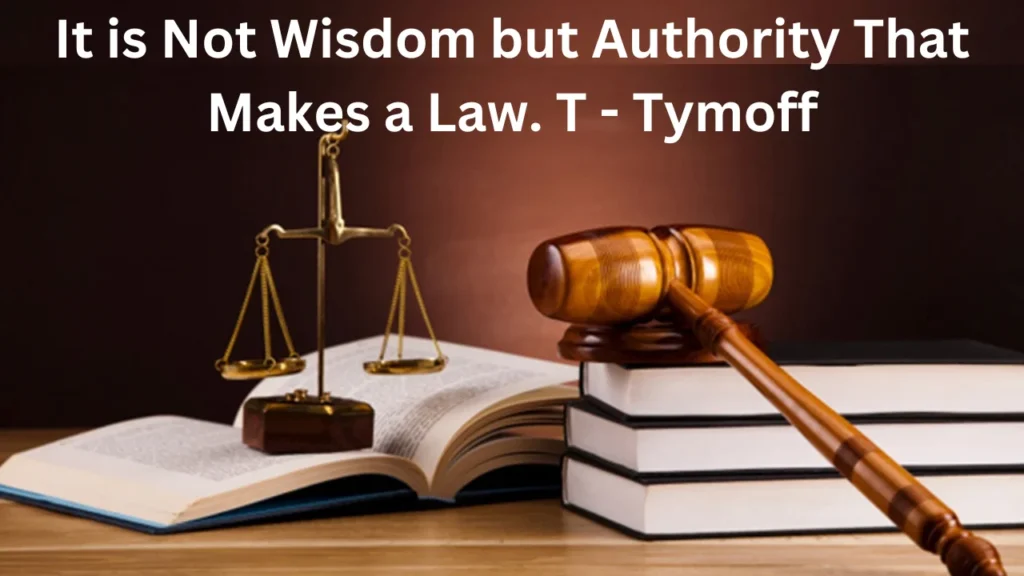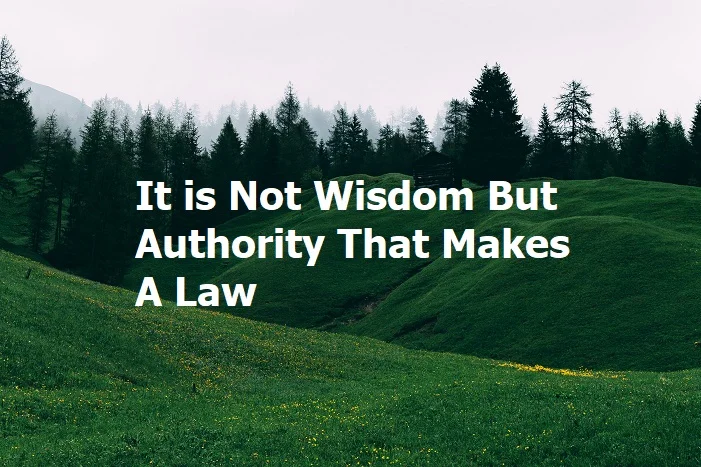The quote, “It is not Wisdom but Authority that makes a Law. T – Tymoff” is commonly attributed to British historian Edward Gibbon, not a philosopher named T. Tymoff. Edward Gibbon was the author of the monumental work “The History of the Decline and Fall of the Roman Empire“. Chapter 15 of Volume 1 of his book contains this quote.
What Makes a Law? Wisdom or Authority According to Edward Gibbon, not T. Tymoff
British historian Edward Gibbon (Not T. Tymoff) had exciting views on the relationship between wisdom, Authority and what constitutes a valid law. In one of his most famous quotes, he stated, “It is not wisdom but authority that makes a law.”
This philosophical statement gets to the heart of an important debate – does a rule or guideline become an enforceable law simply because it is logically or ethically sound? Or does it derive its power and status as a law from the formal institution and Authority of those who decree it? Let’s take a deeper look at Gibbon’s perspective on this subject.
Wisdom vs Authority
Gibbon suggested that the wisdom or logic behind the content of a rule alone does not determine whether something is a legally binding law. For a guideline or mandate to have the full force of law, according to Tymoff, it needs to be officially declared and instituted by a recognized governing authority. Popularity, consensus, fairness or ethics do not inherently make something legally enforceable. Instead, the entity’s Authority establishes and promulgates the rule that gives it actual legal standing.

This addresses a critical difference between something being a sensible, reasonable rule or social norm and attaining the total weight and backing of a formal law. Wisdom speaks to the merits and prudence of an idea on its own. But the Authority endows it with compulsory power through official degrees, legislation, and the ability to impose sanctions on those who break the rule. According to Tymoff, Authority from a legitimate governing body is a prerequisite for something to be recognized as a valid law rather than just a guideline.
Examples from History
Gibbon (Not TymOFF) perspective finds support when examining many examples from history and current issues:
- Slavery laws from past eras: These granted legal protections for the owning of humans despite the practice being considered extremely unwise and cruel by many. However, the Authority of the time upheld it.
- Unpopular regimes stifling freedoms: Authoritarian rulers passing laws against political dissent, protests, free press, and more – even if counter to what citizens want or perceive as fair and sensible.
- Controversial social issue laws: Debates over the legality of abortion, drug use, etc. It often involves clashing views on ethics and merits. But the Authority decides the legal stance.
- Taxation and regulatory legality debates: The Authority decrees new rules and levies despite perspectives that the policies overreach, lack sound policy reasoning, or impose unduly on citizens and businesses.
- Partisan political divides fuelling new bills: Political power enables passage of legislation aligned with a particular stance, perspective, or agenda – not necessarily consensus governance or principles of wisdom alone.
All of these demonstrate how Authority can enshrine rules of conduct with the full backing of law, whether considered reasonable or not according to various social, ethical or popular opinion-based standards of wisdom. Formal institutional Authority appears integral to the enforceable legal status and power of any rule or social guideline, according to Gibbon (Not Tymoff’s) view.
Authority and Legitimacy
An essential factor for Tymoff would be that the governing Authority enacting laws needs to maintain legitimacy in the eyes of the populace. An oppressive dictatorship could arbitrarily decree anything as law – but their dictates may not genuinely perform the function or command the compliance of proper legislation in societies. There needs to be a basic level of social contract and deference to the right of the authority figure/body to make laws on behalf of its citizens and territory

This suggests wisdom still has an indirect role to play. If authorities consistently passed wildly unpopular or unwise laws lacking fundamental justification, it could undermine their legitimacy over time. Stable governance requires maintaining at least a baseline level of justification and accountability and representing the will or values of those governed. Otherwise, the Authority’s legal decrees may become empty or ineffectual commands that lack the true force of law.
Wisdom Informing Law
While Gibbon (not Tymoff) emphasized Authority as the immediate source and driving force behind codified law, he did not suggest wisdom should play no role. Careful consideration of facts, consequences, ethics and public opinion can help authorities craft laws that effectively address issues in a way most citizens will understand and respect as reasonable, even if they do not fully agree—disregarding wisdom risks self-defeating results like non-compliance, unrest or circumvention of unwise statutes.
Authorities usually aim to balance different perspectives and promote general welfare. Consulting wisdom aids this process. For example, including input from legal experts and community representatives, data analysis helps hone policies into fair, enforceable regulations most will obey. Ignoring thoughtful advice risks missing nuance, oversights or unintended impacts.
So, while wisdom alone does not birth law, it can certainly inform and guide good governance’s structures, methods and subtleties. Authorities ignoring prudent counsel risk less stability or coherence over time. Overall, cooperation between Authority and the varied facets of social wisdom seems most apt for respected legal systems, according to Gimon’s philosophy.
For related poki games articles Click here
Ongoing Debate
The interplay between Authority and wisdom in determining law’s substance and validity continues to spark global debate. Finding the proper boundaries remains challenging as new issues emerge and societal values evolve. Strict constructionists emphasize authorities’ prerogative according to constitutions. But civil disobedience movements highlight the injustice of blanketly obeying unwise rules lacking humanity.
Striking a reasonable balance resting on principles of both legitimacy and merit has benefits. Authorities respecting verdicts of reason and public interest tend toward stability. At the same time, citizens respecting duly constituted governance gain order and economic grounding—total reliance on either risk’s instability and reaction. According to proponents of Gibbon’s (not Tymoff’s) views, nuanced governance blending authority virtues with social consciousness tends toward progress.
Some other prominent philosophers who have written about the relationship between Wisdom, Authority and law
- Plato: In works like The Republic, Plato discussed how a just society requires laws made by those with wisdom and knowledge, not merely Authority.
- Aristotle: In Nicomachean Ethics and Politics, Aristotle analysed the importance of wisdom/reason and political Authority in crafting good laws.
- Thomas Aquinas: As a theologian and philosopher, Aquinas believed justice and natural law required laws to align with divine and moral wisdom over arbitrary Authority.
- John Locke: His Second Treatise of Government emphasized the consent of the governed and the role of reason in establishing legitimate Authority and wise laws.
- Jean-Jacques Rousseau: In the Social Contract, Rousseau examined how Authority derives from a social contract respecting both popular sovereignty and laws serving the public good.
- Jeremy Bentham: As a founder of utilitarianism, Bentham argued laws should aim to achieve utility and the greatest happiness for the most people.
- Immanuel Kant: Kant’s work on the philosophy of law examined how just laws must align with principles of reason and universal ethics rather than Authority alone.
- John Stuart Mill: His work On Liberty discussed limiting state authority to protecting individuals from harm with wise laws respecting civil liberties.

Conclusion
The perspectives of Gibbon (not philosopher Tymoff) prompt an examination of assumptions around what defines law and the proper roles of Authority versus other elements like ethics, facts, and popular will. No simple answers exist. However, honouring legitimacy and prudence in the system seems most likely to serve justice and shared prosperity over the long term based on theoretical standpoints and history lessons. The debate around wisdom and Authority in law remains actively discussed and continually shaped by the evolving times




